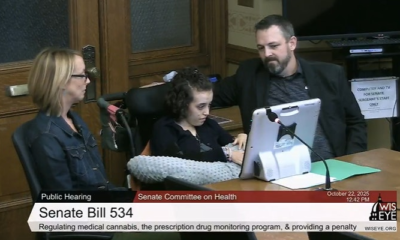Innovative Industrial Properties, Inc. (IIP) (NYSE: IIPR) told investors earlier this week that it was facing problems with some of its tenants, as several had essentially quit paying rent. The news caused the stock price to plunge from roughly $68 to $49 following the news and was lately selling around $55. This prompted equity analysts to grab their erasers and mark down price targets for the company as the options for the company aren’t great.
Green Market Report wrote, “The company believes that it will be better served by proactively seeking to refresh a substantial portion of its tenant base with more financially viable long-term tenants,” Innovative Industrial said in the release, without providing specifics on what exactly it intends to change. That’s probably because the options all point to less money coming to the company.
Alliance Global Partners’ equity analyst Aaron Grey issued a report on April 1 that outlined the company’s various scenarios on dealing with its tenants and none are very palatable.
Tenant struggles
IIP had already warned investors about its biggest customer PharmaCann, which had not paid the rent on several properties. Just as the company assured investors the situation had been resolved and the two agreed on a payment plan, PharmaCann quickly reneged on the deal and quit the payments again. Then TILT Holdings and 4Front were added to the rogue’s gallery of rent dodgers. TILT is trying to sell its Massachusetts properties in a market with few buyers and 4Front is trying to resolve its huge debt problems. Investors then got the final whammy that Gold Flora had to throw in the towel and filed for receivership.
Options
Generally, two options face IIP. Eviction proceedings and hope the company finds a new tenant that pays 100%. Or renegotiate the rent and get some money coming in.
Evictions
Grey wrote, “The alternative of evictions is a route that could be taken, but would take time & eventually come with rents closer to market rate, which would be lower than prior ABR (annualized base rent), particularly in less desirable markets such as MA.” Does the tenant take its plants, if it has any? Does it leave behind the cultivation equipment and then what does IIP do with that? These facilities are specifically designed to grow cannabis plants and may take time to retrofit for a non-cannabis tenant. Add to that an uncertain broader market in this age of shifting tariffs and evictions look like an unpalatable option.
Lower rents
The analyst believes that renegotiated rents are the likely scenario. However, this is easier said than done. IIP has made it clear it doesn’t like partial payments and pushes the tenants to pay back unpaid rent and keep to the original rent agreements. However, one can’t get blood from a turnip. IIP tried calling out the troubled tenants publicly, but that didn’t change the issue of not having enough money to make payments.
Adding to the difficult situation, since Gold Flora is going into receivership, a new owner might have different plans for the company. The AGP report stated that Gold Flora was waiting on the receipt of regulatory approval for its 180k sq ft facility in Palm Springs, which its management has previously said it expected to happen in 2025 and would trigger IIPR rental revenue – but that is now increasingly uncertain.
Grey wrote, “If IIPR holds its stance of not accepting partial payments, this could either deter operators from viewing partial payments as a lever or accelerate additional defaults as other operators struggle with CF & look to refinance.” He thinks 4Front is the tenant with the best chance of rent resolution, but that leaves three others that are a big part of the company’s portfolio.
The analyst also stated that the situation creates a higher anticipation of a dividend cut and a likely hold on any share buyback authorization until the tenant base is stabilized.
Looking ahead
Ultimately, the analyst believes that an overhang of concern regarding incremental tenants moving to partial payment or default will remain. While Grey expects to hear some additional commentary on this during the company’s first quarter earnings call, but believes comfort in the ABR for investors will not be realized until a greater number of underlying tenants complete refinancing.
The analyst maintained his neutral rating and lowered the price target from $70 to $55.

 California Cannabis Updates1 year ago
California Cannabis Updates1 year ago
 Breaking News1 year ago
Breaking News1 year ago
 best list1 year ago
best list1 year ago
 Business1 year ago
Business1 year ago
 Business1 year ago
Business1 year ago
 cbd1 year ago
cbd1 year ago
 Bay Smokes1 year ago
Bay Smokes1 year ago
 autoflower seeds1 year ago
autoflower seeds1 year ago
















































